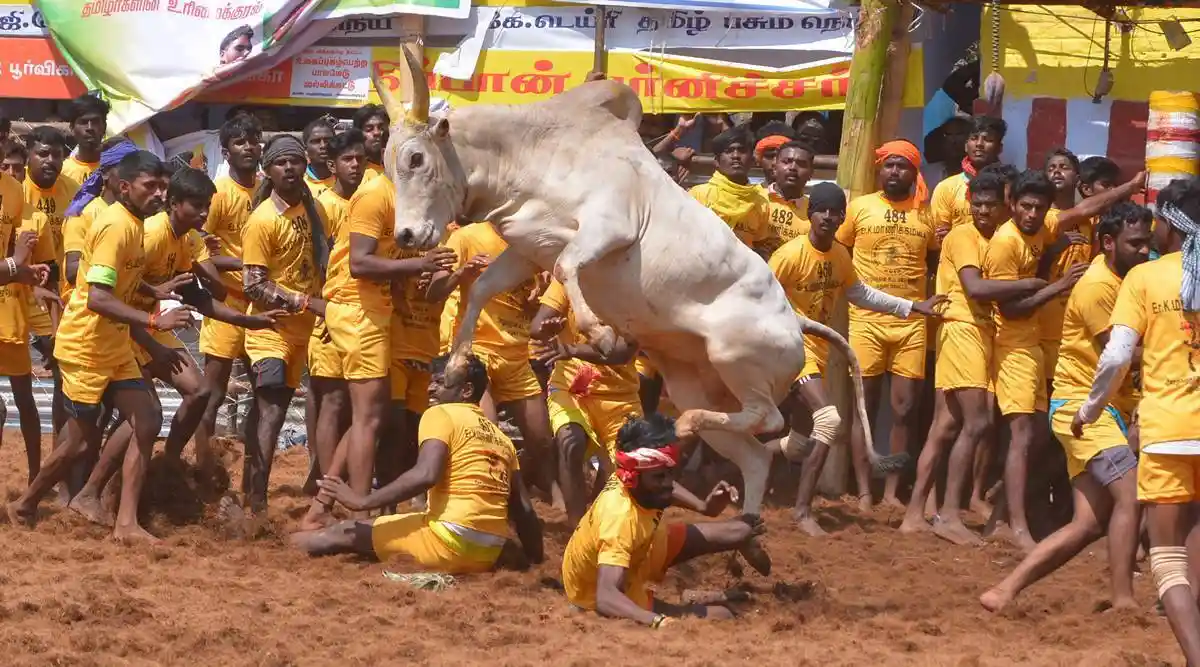Jallikattu: The Pomp of Power
Do you remember the Malayalam movie Jallikattu? It was India's first formal nomination for the Oscar Awards in 2021. It was a proud moment, but did your mind wander to wanting to learn more about this bull-taming game? Jallikattu is a real game rooted in the Indian subcontinent that has fascinated everyone.

Jallikattu. Image Credits: The Indian Express
The celebration of Pongal in Tamil Nadu is well-known when ecstatic hearts scream with joy. Among the observations is a unique game to be played, Jallikattu or Eruthazhuvuthal. And don't get surprised to know that the game is a battle between bulls and men. Yes, you heard it right.
When the crowd of people gathers together with excitement for the Pongal celebrations, they equally long for Jallikatu to start. The howling mass is sometimes enough to cheer the participants and sometimes to make them nervous.
The contestants prepare as a specific bull of the Kangayam breed is brought to the open field. The scorching sands and the enraged bull are now all set to shake the group of participants. The bull is set free in the arena, and the competitors attempt to tame him with bare hands. They do this by holding the bull by its tail or horns while it tries to flee. A participant who keeps a longer grip on the hump is the undoubted winner. Sometimes a sack of coins is also attached to the bull's horns, and the person who succeeds in taming it is declared the winner and hence receives the coins.
This traditional game's origins can be traced back to the Tamil classical period. It was popular among the Ayar community in the Mullai region. Later, it was transformed into a venue for daring demonstrations, with prize money offered to motivate participants.
Several rock paintings dating back 3500 years have been discovered in the Karikkiyur village of Tamil Nadu, depicting men fighting with bulls. A cave in Kalluthu Mettupatti is also engraved with a painting of a man alone taming a bull. All these signs suggest that the game originated thousands of years ago.
In India, many festivals and customs are based on mythical events and happenings, the same is with Jallikattu. Some people connect Jallikattu to Hindu mythology and Lord Krishna. In the Bhagavad Gita, the ritual is claimed to have begun when Lord Krishna split into seven forms to subdue and confine the bulls. Another set of people also believes that Jallikattu is the result of Lord Shiva's curse on his bull Basava after he misread the Lord's word.
The celebration of the event has received widespread support and promotion worldwide. However, PETA (People for the Ethical Treatment of Animals) India, on the other hand, expressed concern that the sport was unethical and resulted in animal cruelty. Various means, such as intoxication, are employed to enrage the bull in preparation for the fight. In their attempts to tame the bull, people also frequently end up injuring it.
Not only have animals been harmed, but participants have also suffered serious injuries and, in some cases, death. PETA has been campaigning against the sport since 2004, and the Supreme Court of India eventually banned it, stopping hundreds of people from participating in this bloody battle.
However, many individuals quickly criticized the Supreme Court's ruling as a smack in the face of Tamil culture. According to the locals, the bulls were not harmed during the fight. However, it is a way to celebrate cattle during Pongal. Jallikattu is used to evaluate bulls, and their price is determined by their strength and the difficulty of taming them. Several protests were started against the decision of the Supreme Court.
These protests were peaceful but powerful, and the Centre and State governments were forced to overturn the Supreme Court's decision and lift the ban on the sport. Since then, Jallikattu has become lawful in Tamil Nadu.
In the end, Tamilians discovered a means to resurrect their tradition and culture. This sport has become an important element of Tamil Nadu's culture. Every time the excitement level rises during the festival, Pongal remains incomplete without Jallikattu.


